Entrepreneurship and Leadership: A Reflective Report Analysis
VerifiedAdded on 2022/12/27
|14
|2318
|64
Report
AI Summary
This report is a reflective analysis of leadership styles, entrepreneurial qualities, and their impact on business ventures. It begins with an introduction to entrepreneurship and the importance of leadership, followed by an exploration of different leadership styles (autocratic, democratic, bureaucratic, and laissez-faire) and their application. The report delves into entrepreneurial qualities like motivation, creativity, and vision, as well as characteristics such as confidence and decision-making. It then examines how specific traits and attributes, including passion, risk-taking, and technology, add value to businesses, providing examples to illustrate these concepts. The report concludes by summarizing the key findings and emphasizing the importance of these qualities and characteristics in achieving success in business ventures, referencing relevant research throughout.
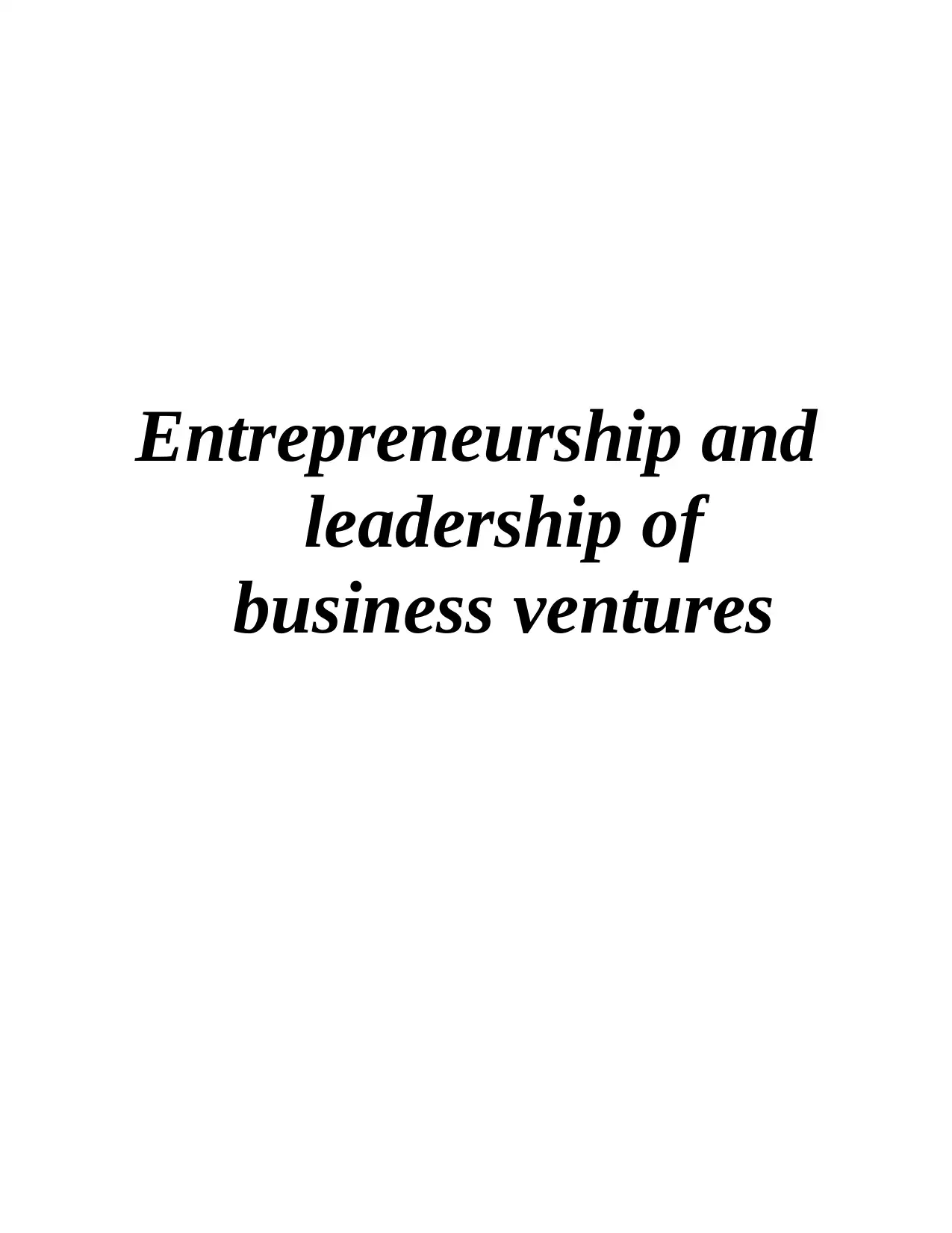
Entrepreneurship and
leadership of
business ventures
leadership of
business ventures
Paraphrase This Document
Need a fresh take? Get an instant paraphrase of this document with our AI Paraphraser
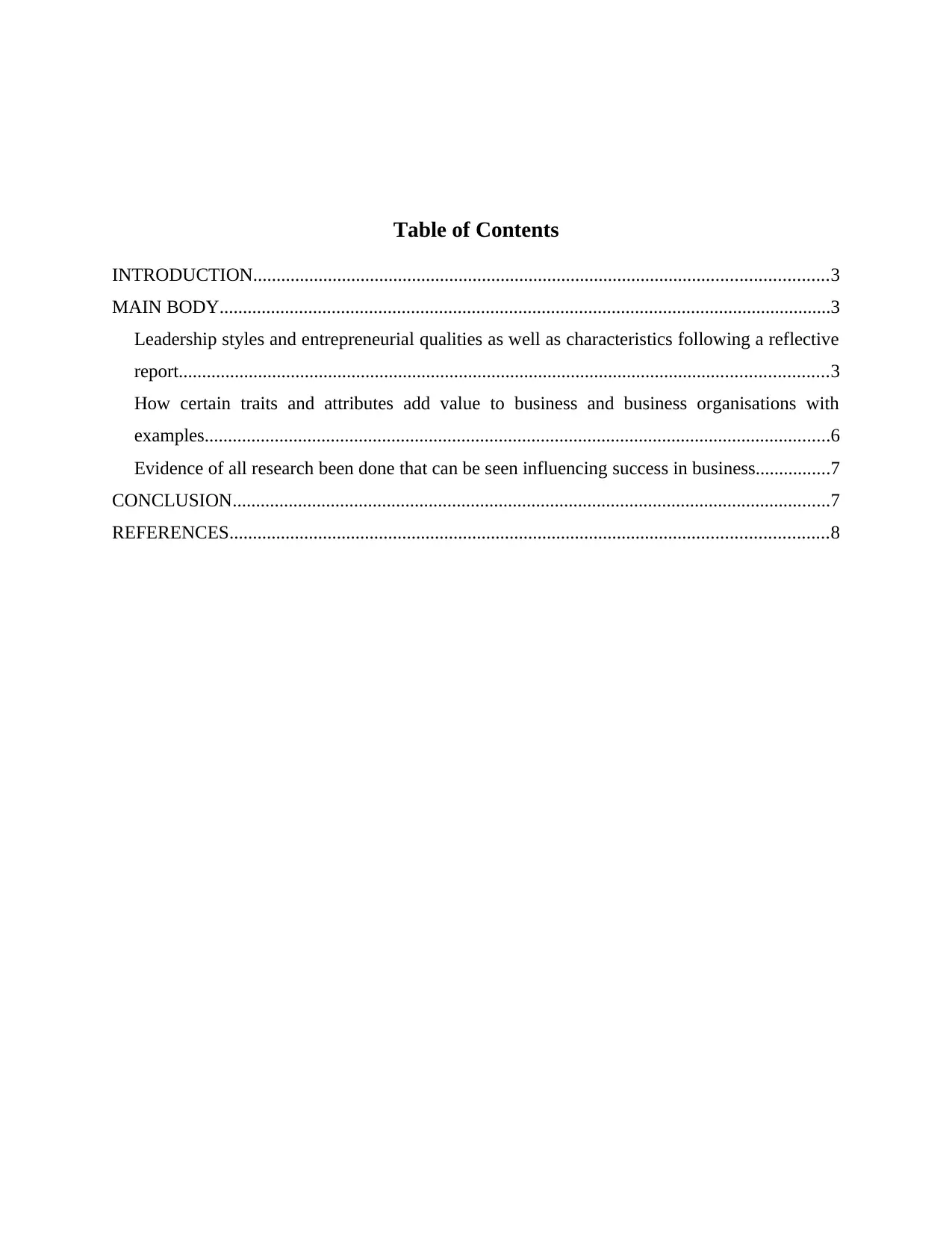
Table of Contents
INTRODUCTION...........................................................................................................................3
MAIN BODY...................................................................................................................................3
Leadership styles and entrepreneurial qualities as well as characteristics following a reflective
report...........................................................................................................................................3
How certain traits and attributes add value to business and business organisations with
examples......................................................................................................................................6
Evidence of all research been done that can be seen influencing success in business................7
CONCLUSION................................................................................................................................7
REFERENCES................................................................................................................................8
INTRODUCTION...........................................................................................................................3
MAIN BODY...................................................................................................................................3
Leadership styles and entrepreneurial qualities as well as characteristics following a reflective
report...........................................................................................................................................3
How certain traits and attributes add value to business and business organisations with
examples......................................................................................................................................6
Evidence of all research been done that can be seen influencing success in business................7
CONCLUSION................................................................................................................................7
REFERENCES................................................................................................................................8
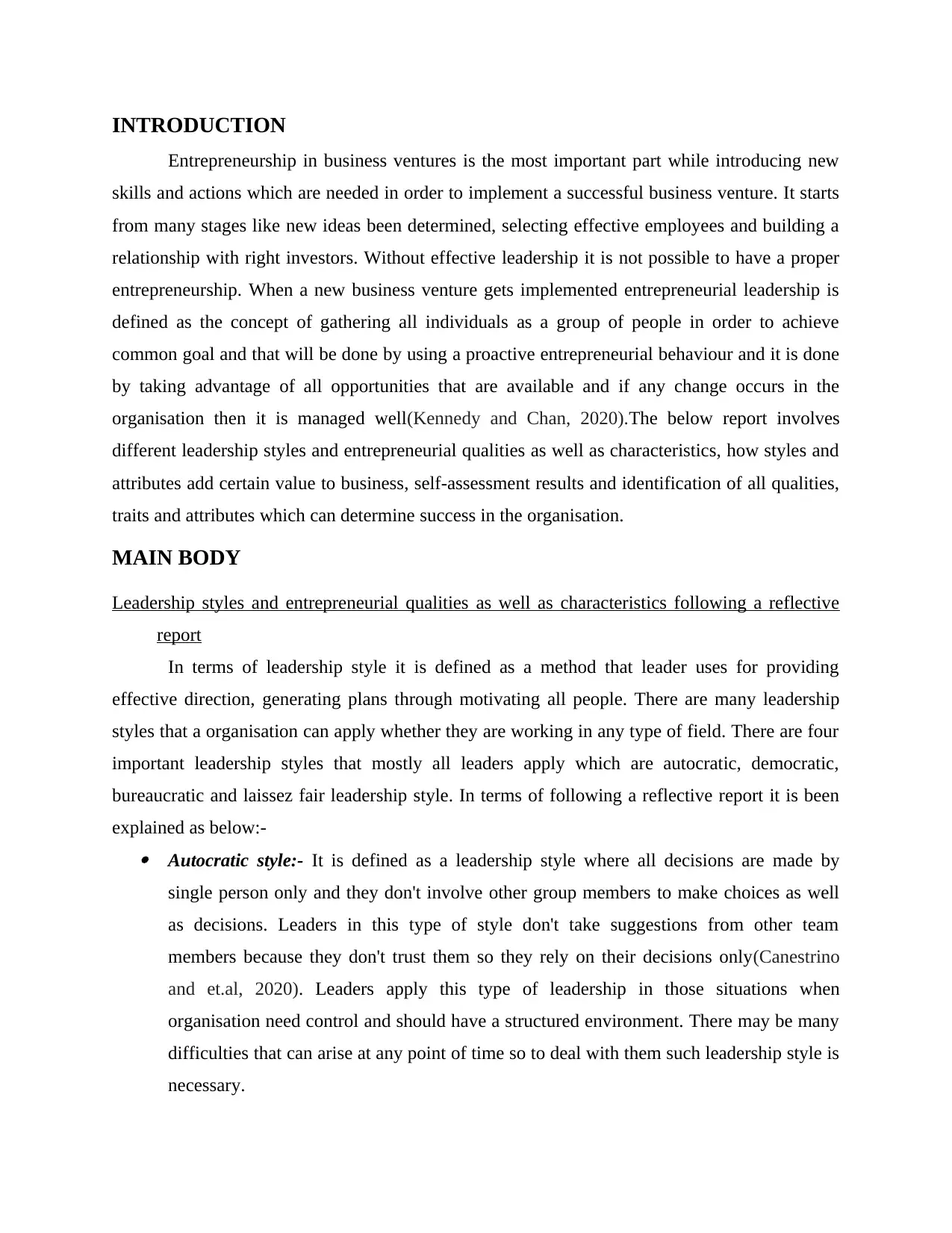
INTRODUCTION
Entrepreneurship in business ventures is the most important part while introducing new
skills and actions which are needed in order to implement a successful business venture. It starts
from many stages like new ideas been determined, selecting effective employees and building a
relationship with right investors. Without effective leadership it is not possible to have a proper
entrepreneurship. When a new business venture gets implemented entrepreneurial leadership is
defined as the concept of gathering all individuals as a group of people in order to achieve
common goal and that will be done by using a proactive entrepreneurial behaviour and it is done
by taking advantage of all opportunities that are available and if any change occurs in the
organisation then it is managed well(Kennedy and Chan, 2020).The below report involves
different leadership styles and entrepreneurial qualities as well as characteristics, how styles and
attributes add certain value to business, self-assessment results and identification of all qualities,
traits and attributes which can determine success in the organisation.
MAIN BODY
Leadership styles and entrepreneurial qualities as well as characteristics following a reflective
report
In terms of leadership style it is defined as a method that leader uses for providing
effective direction, generating plans through motivating all people. There are many leadership
styles that a organisation can apply whether they are working in any type of field. There are four
important leadership styles that mostly all leaders apply which are autocratic, democratic,
bureaucratic and laissez fair leadership style. In terms of following a reflective report it is been
explained as below:- Autocratic style:- It is defined as a leadership style where all decisions are made by
single person only and they don't involve other group members to make choices as well
as decisions. Leaders in this type of style don't take suggestions from other team
members because they don't trust them so they rely on their decisions only(Canestrino
and et.al, 2020). Leaders apply this type of leadership in those situations when
organisation need control and should have a structured environment. There may be many
difficulties that can arise at any point of time so to deal with them such leadership style is
necessary.
Entrepreneurship in business ventures is the most important part while introducing new
skills and actions which are needed in order to implement a successful business venture. It starts
from many stages like new ideas been determined, selecting effective employees and building a
relationship with right investors. Without effective leadership it is not possible to have a proper
entrepreneurship. When a new business venture gets implemented entrepreneurial leadership is
defined as the concept of gathering all individuals as a group of people in order to achieve
common goal and that will be done by using a proactive entrepreneurial behaviour and it is done
by taking advantage of all opportunities that are available and if any change occurs in the
organisation then it is managed well(Kennedy and Chan, 2020).The below report involves
different leadership styles and entrepreneurial qualities as well as characteristics, how styles and
attributes add certain value to business, self-assessment results and identification of all qualities,
traits and attributes which can determine success in the organisation.
MAIN BODY
Leadership styles and entrepreneurial qualities as well as characteristics following a reflective
report
In terms of leadership style it is defined as a method that leader uses for providing
effective direction, generating plans through motivating all people. There are many leadership
styles that a organisation can apply whether they are working in any type of field. There are four
important leadership styles that mostly all leaders apply which are autocratic, democratic,
bureaucratic and laissez fair leadership style. In terms of following a reflective report it is been
explained as below:- Autocratic style:- It is defined as a leadership style where all decisions are made by
single person only and they don't involve other group members to make choices as well
as decisions. Leaders in this type of style don't take suggestions from other team
members because they don't trust them so they rely on their decisions only(Canestrino
and et.al, 2020). Leaders apply this type of leadership in those situations when
organisation need control and should have a structured environment. There may be many
difficulties that can arise at any point of time so to deal with them such leadership style is
necessary.
⊘ This is a preview!⊘
Do you want full access?
Subscribe today to unlock all pages.

Trusted by 1+ million students worldwide
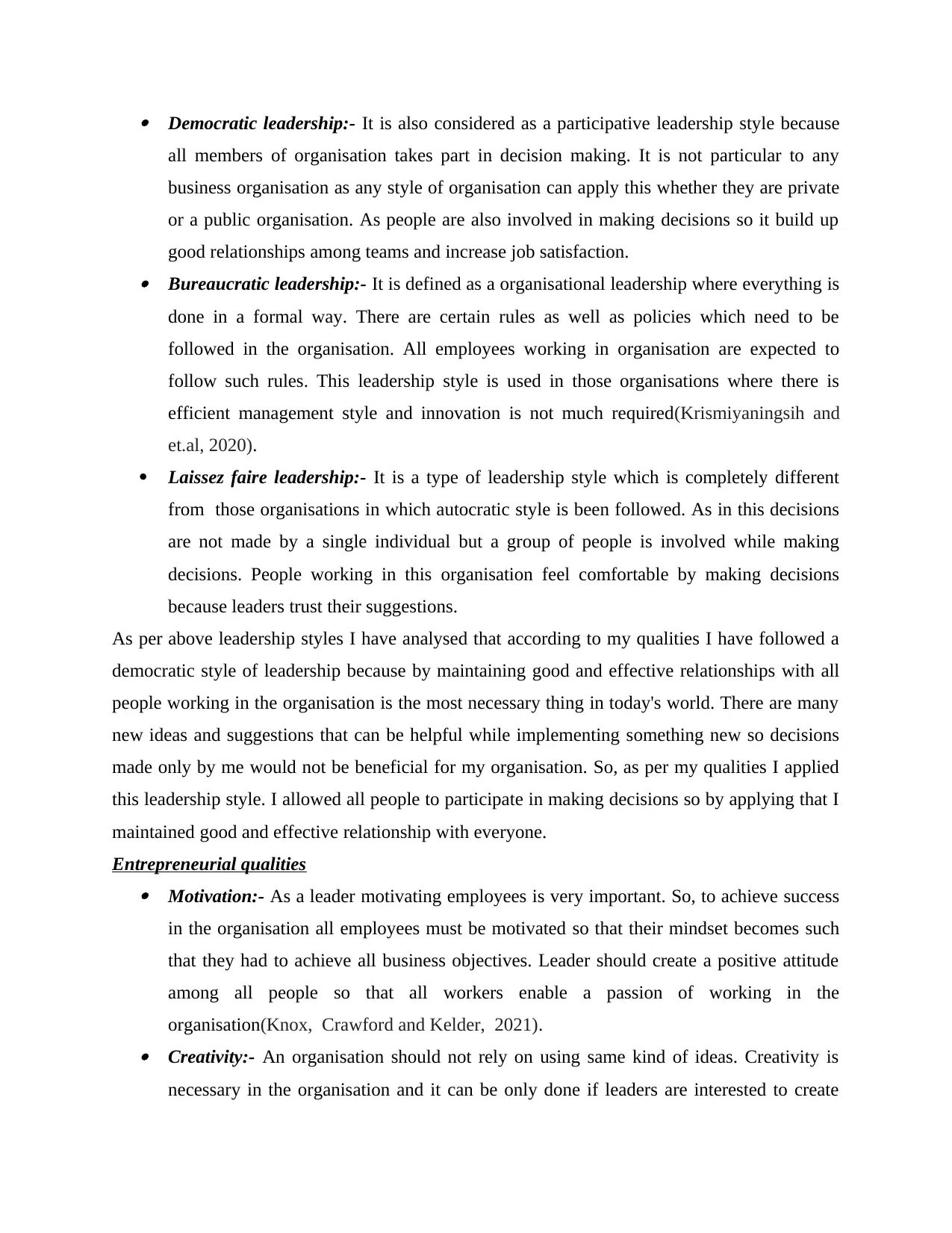
Democratic leadership:- It is also considered as a participative leadership style because
all members of organisation takes part in decision making. It is not particular to any
business organisation as any style of organisation can apply this whether they are private
or a public organisation. As people are also involved in making decisions so it build up
good relationships among teams and increase job satisfaction. Bureaucratic leadership:- It is defined as a organisational leadership where everything is
done in a formal way. There are certain rules as well as policies which need to be
followed in the organisation. All employees working in organisation are expected to
follow such rules. This leadership style is used in those organisations where there is
efficient management style and innovation is not much required(Krismiyaningsih and
et.al, 2020).
Laissez faire leadership:- It is a type of leadership style which is completely different
from those organisations in which autocratic style is been followed. As in this decisions
are not made by a single individual but a group of people is involved while making
decisions. People working in this organisation feel comfortable by making decisions
because leaders trust their suggestions.
As per above leadership styles I have analysed that according to my qualities I have followed a
democratic style of leadership because by maintaining good and effective relationships with all
people working in the organisation is the most necessary thing in today's world. There are many
new ideas and suggestions that can be helpful while implementing something new so decisions
made only by me would not be beneficial for my organisation. So, as per my qualities I applied
this leadership style. I allowed all people to participate in making decisions so by applying that I
maintained good and effective relationship with everyone.
Entrepreneurial qualities Motivation:- As a leader motivating employees is very important. So, to achieve success
in the organisation all employees must be motivated so that their mindset becomes such
that they had to achieve all business objectives. Leader should create a positive attitude
among all people so that all workers enable a passion of working in the
organisation(Knox, Crawford and Kelder, 2021). Creativity:- An organisation should not rely on using same kind of ideas. Creativity is
necessary in the organisation and it can be only done if leaders are interested to create
all members of organisation takes part in decision making. It is not particular to any
business organisation as any style of organisation can apply this whether they are private
or a public organisation. As people are also involved in making decisions so it build up
good relationships among teams and increase job satisfaction. Bureaucratic leadership:- It is defined as a organisational leadership where everything is
done in a formal way. There are certain rules as well as policies which need to be
followed in the organisation. All employees working in organisation are expected to
follow such rules. This leadership style is used in those organisations where there is
efficient management style and innovation is not much required(Krismiyaningsih and
et.al, 2020).
Laissez faire leadership:- It is a type of leadership style which is completely different
from those organisations in which autocratic style is been followed. As in this decisions
are not made by a single individual but a group of people is involved while making
decisions. People working in this organisation feel comfortable by making decisions
because leaders trust their suggestions.
As per above leadership styles I have analysed that according to my qualities I have followed a
democratic style of leadership because by maintaining good and effective relationships with all
people working in the organisation is the most necessary thing in today's world. There are many
new ideas and suggestions that can be helpful while implementing something new so decisions
made only by me would not be beneficial for my organisation. So, as per my qualities I applied
this leadership style. I allowed all people to participate in making decisions so by applying that I
maintained good and effective relationship with everyone.
Entrepreneurial qualities Motivation:- As a leader motivating employees is very important. So, to achieve success
in the organisation all employees must be motivated so that their mindset becomes such
that they had to achieve all business objectives. Leader should create a positive attitude
among all people so that all workers enable a passion of working in the
organisation(Knox, Crawford and Kelder, 2021). Creativity:- An organisation should not rely on using same kind of ideas. Creativity is
necessary in the organisation and it can be only done if leaders are interested to create
Paraphrase This Document
Need a fresh take? Get an instant paraphrase of this document with our AI Paraphraser
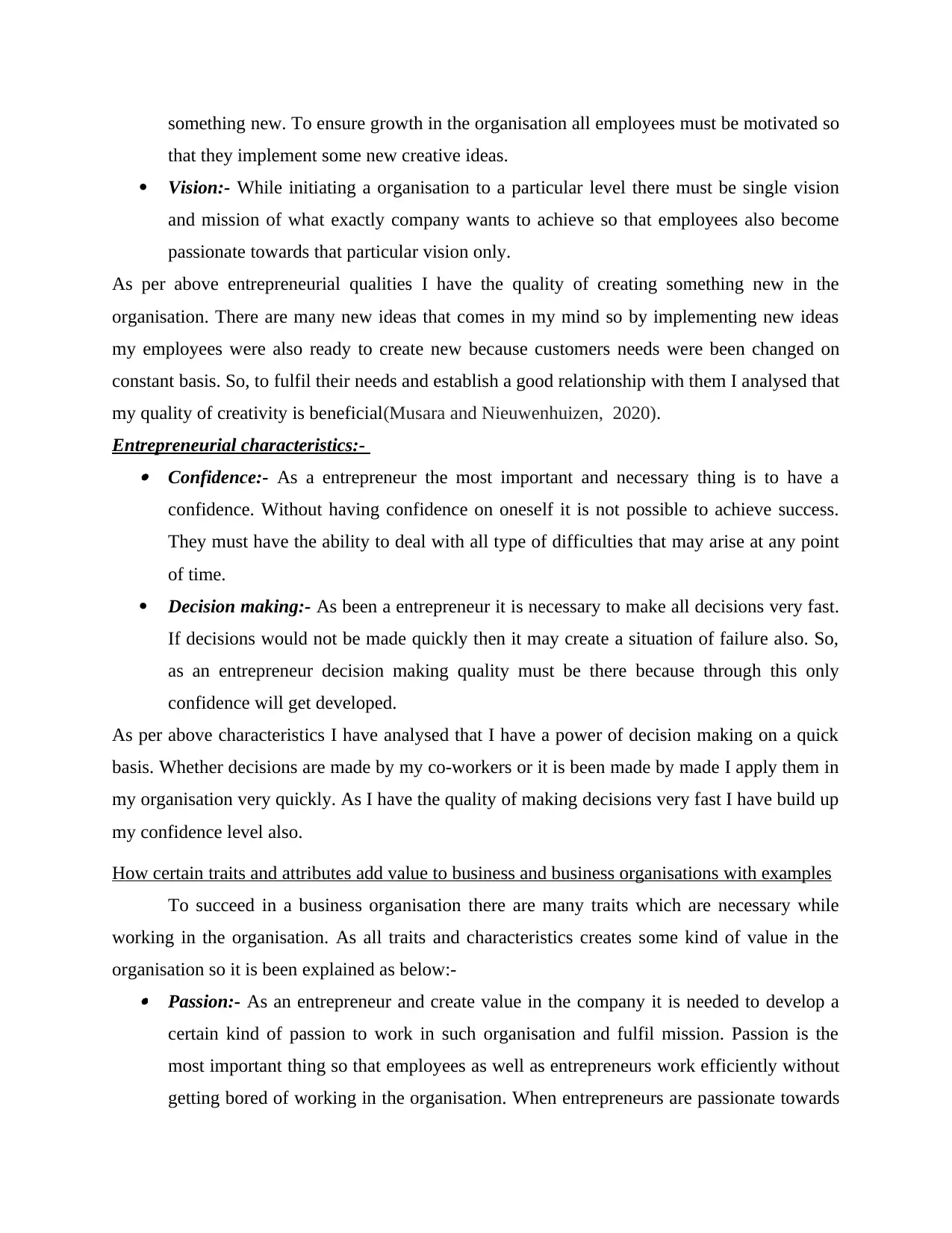
something new. To ensure growth in the organisation all employees must be motivated so
that they implement some new creative ideas.
Vision:- While initiating a organisation to a particular level there must be single vision
and mission of what exactly company wants to achieve so that employees also become
passionate towards that particular vision only.
As per above entrepreneurial qualities I have the quality of creating something new in the
organisation. There are many new ideas that comes in my mind so by implementing new ideas
my employees were also ready to create new because customers needs were been changed on
constant basis. So, to fulfil their needs and establish a good relationship with them I analysed that
my quality of creativity is beneficial(Musara and Nieuwenhuizen, 2020).
Entrepreneurial characteristics:- Confidence:- As a entrepreneur the most important and necessary thing is to have a
confidence. Without having confidence on oneself it is not possible to achieve success.
They must have the ability to deal with all type of difficulties that may arise at any point
of time.
Decision making:- As been a entrepreneur it is necessary to make all decisions very fast.
If decisions would not be made quickly then it may create a situation of failure also. So,
as an entrepreneur decision making quality must be there because through this only
confidence will get developed.
As per above characteristics I have analysed that I have a power of decision making on a quick
basis. Whether decisions are made by my co-workers or it is been made by made I apply them in
my organisation very quickly. As I have the quality of making decisions very fast I have build up
my confidence level also.
How certain traits and attributes add value to business and business organisations with examples
To succeed in a business organisation there are many traits which are necessary while
working in the organisation. As all traits and characteristics creates some kind of value in the
organisation so it is been explained as below:- Passion:- As an entrepreneur and create value in the company it is needed to develop a
certain kind of passion to work in such organisation and fulfil mission. Passion is the
most important thing so that employees as well as entrepreneurs work efficiently without
getting bored of working in the organisation. When entrepreneurs are passionate towards
that they implement some new creative ideas.
Vision:- While initiating a organisation to a particular level there must be single vision
and mission of what exactly company wants to achieve so that employees also become
passionate towards that particular vision only.
As per above entrepreneurial qualities I have the quality of creating something new in the
organisation. There are many new ideas that comes in my mind so by implementing new ideas
my employees were also ready to create new because customers needs were been changed on
constant basis. So, to fulfil their needs and establish a good relationship with them I analysed that
my quality of creativity is beneficial(Musara and Nieuwenhuizen, 2020).
Entrepreneurial characteristics:- Confidence:- As a entrepreneur the most important and necessary thing is to have a
confidence. Without having confidence on oneself it is not possible to achieve success.
They must have the ability to deal with all type of difficulties that may arise at any point
of time.
Decision making:- As been a entrepreneur it is necessary to make all decisions very fast.
If decisions would not be made quickly then it may create a situation of failure also. So,
as an entrepreneur decision making quality must be there because through this only
confidence will get developed.
As per above characteristics I have analysed that I have a power of decision making on a quick
basis. Whether decisions are made by my co-workers or it is been made by made I apply them in
my organisation very quickly. As I have the quality of making decisions very fast I have build up
my confidence level also.
How certain traits and attributes add value to business and business organisations with examples
To succeed in a business organisation there are many traits which are necessary while
working in the organisation. As all traits and characteristics creates some kind of value in the
organisation so it is been explained as below:- Passion:- As an entrepreneur and create value in the company it is needed to develop a
certain kind of passion to work in such organisation and fulfil mission. Passion is the
most important thing so that employees as well as entrepreneurs work efficiently without
getting bored of working in the organisation. When entrepreneurs are passionate towards
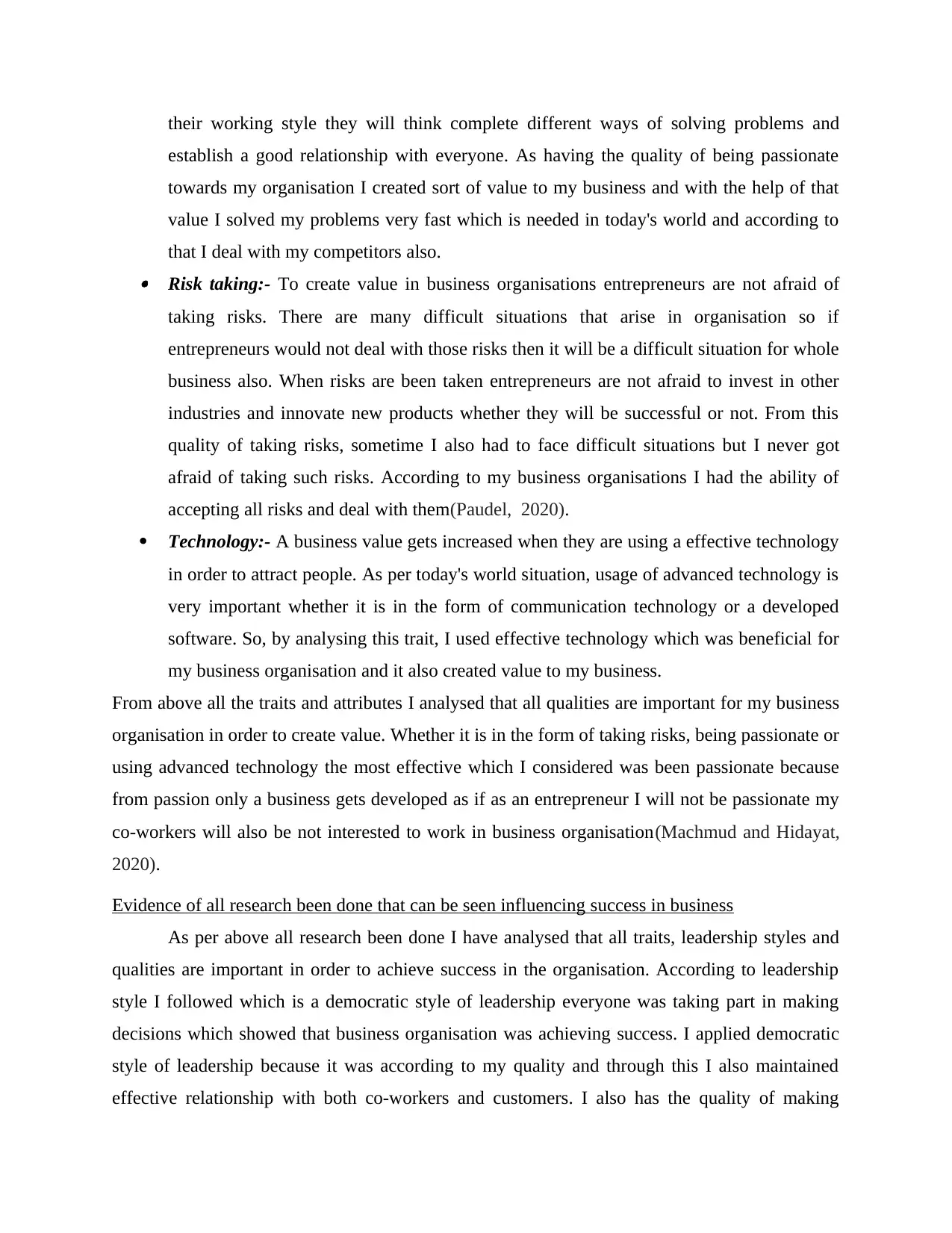
their working style they will think complete different ways of solving problems and
establish a good relationship with everyone. As having the quality of being passionate
towards my organisation I created sort of value to my business and with the help of that
value I solved my problems very fast which is needed in today's world and according to
that I deal with my competitors also. Risk taking:- To create value in business organisations entrepreneurs are not afraid of
taking risks. There are many difficult situations that arise in organisation so if
entrepreneurs would not deal with those risks then it will be a difficult situation for whole
business also. When risks are been taken entrepreneurs are not afraid to invest in other
industries and innovate new products whether they will be successful or not. From this
quality of taking risks, sometime I also had to face difficult situations but I never got
afraid of taking such risks. According to my business organisations I had the ability of
accepting all risks and deal with them(Paudel, 2020).
Technology:- A business value gets increased when they are using a effective technology
in order to attract people. As per today's world situation, usage of advanced technology is
very important whether it is in the form of communication technology or a developed
software. So, by analysing this trait, I used effective technology which was beneficial for
my business organisation and it also created value to my business.
From above all the traits and attributes I analysed that all qualities are important for my business
organisation in order to create value. Whether it is in the form of taking risks, being passionate or
using advanced technology the most effective which I considered was been passionate because
from passion only a business gets developed as if as an entrepreneur I will not be passionate my
co-workers will also be not interested to work in business organisation(Machmud and Hidayat,
2020).
Evidence of all research been done that can be seen influencing success in business
As per above all research been done I have analysed that all traits, leadership styles and
qualities are important in order to achieve success in the organisation. According to leadership
style I followed which is a democratic style of leadership everyone was taking part in making
decisions which showed that business organisation was achieving success. I applied democratic
style of leadership because it was according to my quality and through this I also maintained
effective relationship with both co-workers and customers. I also has the quality of making
establish a good relationship with everyone. As having the quality of being passionate
towards my organisation I created sort of value to my business and with the help of that
value I solved my problems very fast which is needed in today's world and according to
that I deal with my competitors also. Risk taking:- To create value in business organisations entrepreneurs are not afraid of
taking risks. There are many difficult situations that arise in organisation so if
entrepreneurs would not deal with those risks then it will be a difficult situation for whole
business also. When risks are been taken entrepreneurs are not afraid to invest in other
industries and innovate new products whether they will be successful or not. From this
quality of taking risks, sometime I also had to face difficult situations but I never got
afraid of taking such risks. According to my business organisations I had the ability of
accepting all risks and deal with them(Paudel, 2020).
Technology:- A business value gets increased when they are using a effective technology
in order to attract people. As per today's world situation, usage of advanced technology is
very important whether it is in the form of communication technology or a developed
software. So, by analysing this trait, I used effective technology which was beneficial for
my business organisation and it also created value to my business.
From above all the traits and attributes I analysed that all qualities are important for my business
organisation in order to create value. Whether it is in the form of taking risks, being passionate or
using advanced technology the most effective which I considered was been passionate because
from passion only a business gets developed as if as an entrepreneur I will not be passionate my
co-workers will also be not interested to work in business organisation(Machmud and Hidayat,
2020).
Evidence of all research been done that can be seen influencing success in business
As per above all research been done I have analysed that all traits, leadership styles and
qualities are important in order to achieve success in the organisation. According to leadership
style I followed which is a democratic style of leadership everyone was taking part in making
decisions which showed that business organisation was achieving success. I applied democratic
style of leadership because it was according to my quality and through this I also maintained
effective relationship with both co-workers and customers. I also has the quality of making
⊘ This is a preview!⊘
Do you want full access?
Subscribe today to unlock all pages.

Trusted by 1+ million students worldwide
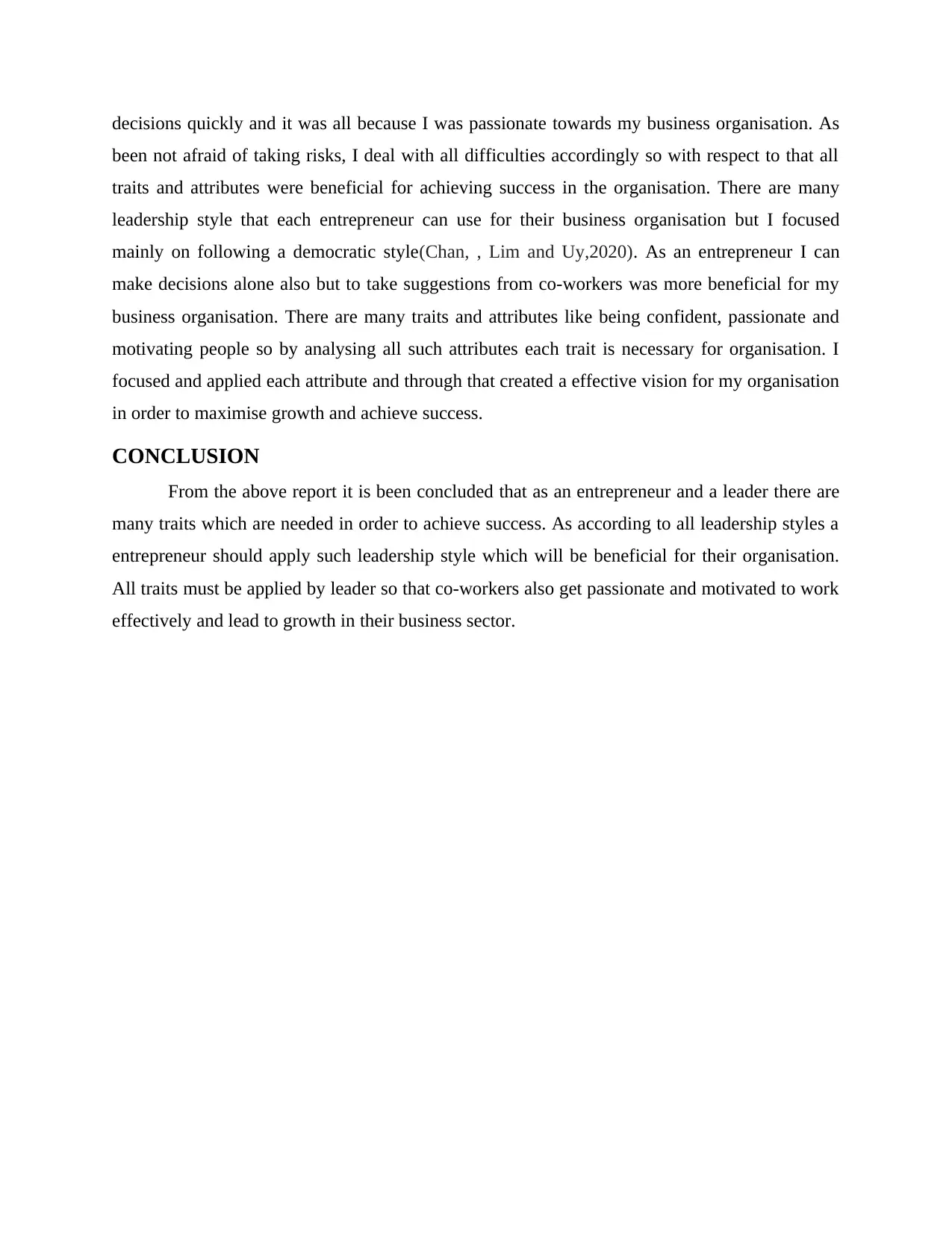
decisions quickly and it was all because I was passionate towards my business organisation. As
been not afraid of taking risks, I deal with all difficulties accordingly so with respect to that all
traits and attributes were beneficial for achieving success in the organisation. There are many
leadership style that each entrepreneur can use for their business organisation but I focused
mainly on following a democratic style(Chan, , Lim and Uy,2020). As an entrepreneur I can
make decisions alone also but to take suggestions from co-workers was more beneficial for my
business organisation. There are many traits and attributes like being confident, passionate and
motivating people so by analysing all such attributes each trait is necessary for organisation. I
focused and applied each attribute and through that created a effective vision for my organisation
in order to maximise growth and achieve success.
CONCLUSION
From the above report it is been concluded that as an entrepreneur and a leader there are
many traits which are needed in order to achieve success. As according to all leadership styles a
entrepreneur should apply such leadership style which will be beneficial for their organisation.
All traits must be applied by leader so that co-workers also get passionate and motivated to work
effectively and lead to growth in their business sector.
been not afraid of taking risks, I deal with all difficulties accordingly so with respect to that all
traits and attributes were beneficial for achieving success in the organisation. There are many
leadership style that each entrepreneur can use for their business organisation but I focused
mainly on following a democratic style(Chan, , Lim and Uy,2020). As an entrepreneur I can
make decisions alone also but to take suggestions from co-workers was more beneficial for my
business organisation. There are many traits and attributes like being confident, passionate and
motivating people so by analysing all such attributes each trait is necessary for organisation. I
focused and applied each attribute and through that created a effective vision for my organisation
in order to maximise growth and achieve success.
CONCLUSION
From the above report it is been concluded that as an entrepreneur and a leader there are
many traits which are needed in order to achieve success. As according to all leadership styles a
entrepreneur should apply such leadership style which will be beneficial for their organisation.
All traits must be applied by leader so that co-workers also get passionate and motivated to work
effectively and lead to growth in their business sector.
Paraphrase This Document
Need a fresh take? Get an instant paraphrase of this document with our AI Paraphraser
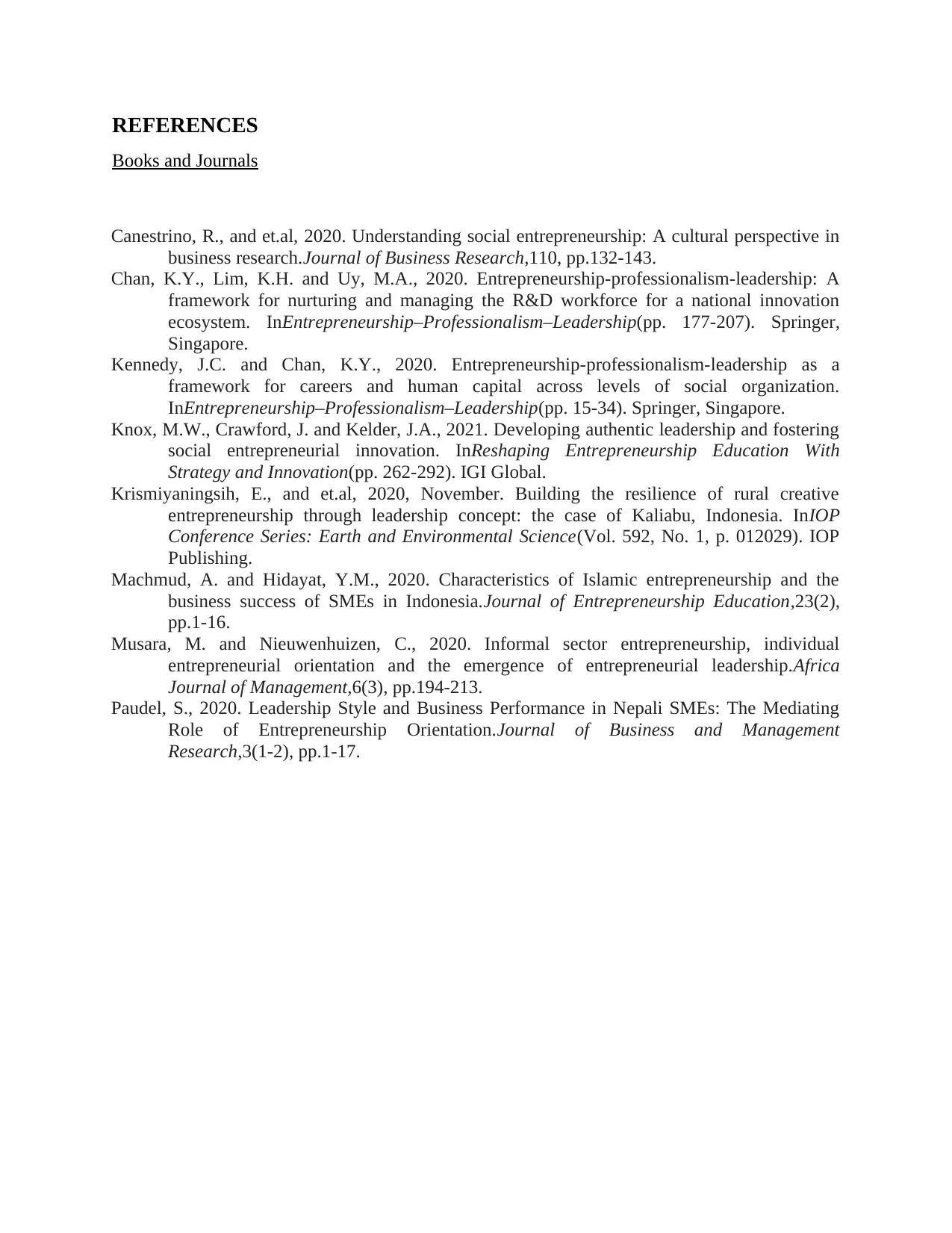
REFERENCES
Books and Journals
Canestrino, R., and et.al, 2020. Understanding social entrepreneurship: A cultural perspective in
business research.Journal of Business Research,110, pp.132-143.
Chan, K.Y., Lim, K.H. and Uy, M.A., 2020. Entrepreneurship-professionalism-leadership: A
framework for nurturing and managing the R&D workforce for a national innovation
ecosystem. InEntrepreneurship–Professionalism–Leadership(pp. 177-207). Springer,
Singapore.
Kennedy, J.C. and Chan, K.Y., 2020. Entrepreneurship-professionalism-leadership as a
framework for careers and human capital across levels of social organization.
InEntrepreneurship–Professionalism–Leadership(pp. 15-34). Springer, Singapore.
Knox, M.W., Crawford, J. and Kelder, J.A., 2021. Developing authentic leadership and fostering
social entrepreneurial innovation. InReshaping Entrepreneurship Education With
Strategy and Innovation(pp. 262-292). IGI Global.
Krismiyaningsih, E., and et.al, 2020, November. Building the resilience of rural creative
entrepreneurship through leadership concept: the case of Kaliabu, Indonesia. InIOP
Conference Series: Earth and Environmental Science(Vol. 592, No. 1, p. 012029). IOP
Publishing.
Machmud, A. and Hidayat, Y.M., 2020. Characteristics of Islamic entrepreneurship and the
business success of SMEs in Indonesia.Journal of Entrepreneurship Education,23(2),
pp.1-16.
Musara, M. and Nieuwenhuizen, C., 2020. Informal sector entrepreneurship, individual
entrepreneurial orientation and the emergence of entrepreneurial leadership.Africa
Journal of Management,6(3), pp.194-213.
Paudel, S., 2020. Leadership Style and Business Performance in Nepali SMEs: The Mediating
Role of Entrepreneurship Orientation.Journal of Business and Management
Research,3(1-2), pp.1-17.
Books and Journals
Canestrino, R., and et.al, 2020. Understanding social entrepreneurship: A cultural perspective in
business research.Journal of Business Research,110, pp.132-143.
Chan, K.Y., Lim, K.H. and Uy, M.A., 2020. Entrepreneurship-professionalism-leadership: A
framework for nurturing and managing the R&D workforce for a national innovation
ecosystem. InEntrepreneurship–Professionalism–Leadership(pp. 177-207). Springer,
Singapore.
Kennedy, J.C. and Chan, K.Y., 2020. Entrepreneurship-professionalism-leadership as a
framework for careers and human capital across levels of social organization.
InEntrepreneurship–Professionalism–Leadership(pp. 15-34). Springer, Singapore.
Knox, M.W., Crawford, J. and Kelder, J.A., 2021. Developing authentic leadership and fostering
social entrepreneurial innovation. InReshaping Entrepreneurship Education With
Strategy and Innovation(pp. 262-292). IGI Global.
Krismiyaningsih, E., and et.al, 2020, November. Building the resilience of rural creative
entrepreneurship through leadership concept: the case of Kaliabu, Indonesia. InIOP
Conference Series: Earth and Environmental Science(Vol. 592, No. 1, p. 012029). IOP
Publishing.
Machmud, A. and Hidayat, Y.M., 2020. Characteristics of Islamic entrepreneurship and the
business success of SMEs in Indonesia.Journal of Entrepreneurship Education,23(2),
pp.1-16.
Musara, M. and Nieuwenhuizen, C., 2020. Informal sector entrepreneurship, individual
entrepreneurial orientation and the emergence of entrepreneurial leadership.Africa
Journal of Management,6(3), pp.194-213.
Paudel, S., 2020. Leadership Style and Business Performance in Nepali SMEs: The Mediating
Role of Entrepreneurship Orientation.Journal of Business and Management
Research,3(1-2), pp.1-17.

⊘ This is a preview!⊘
Do you want full access?
Subscribe today to unlock all pages.

Trusted by 1+ million students worldwide

Paraphrase This Document
Need a fresh take? Get an instant paraphrase of this document with our AI Paraphraser


⊘ This is a preview!⊘
Do you want full access?
Subscribe today to unlock all pages.

Trusted by 1+ million students worldwide
1 out of 14
Related Documents
Your All-in-One AI-Powered Toolkit for Academic Success.
+13062052269
info@desklib.com
Available 24*7 on WhatsApp / Email
![[object Object]](/_next/static/media/star-bottom.7253800d.svg)
Unlock your academic potential
Copyright © 2020–2026 A2Z Services. All Rights Reserved. Developed and managed by ZUCOL.




